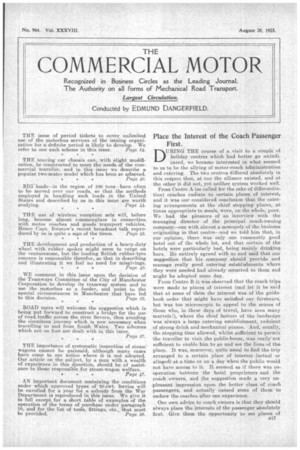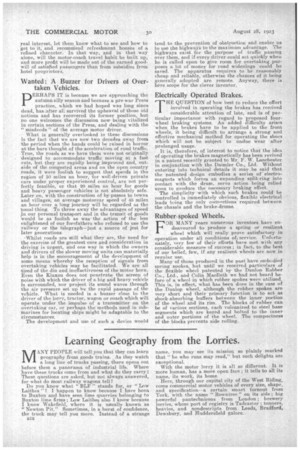Place the Interest of the Coach Passenger First. •
Page 1

Page 2

If you've noticed an error in this article please click here to report it so we can fix it.
URING THE course of a visit to a couple of holiday centres which had better go unindi cated, we became interested in what seemed to us to be the allying of motor-coach administration and catering. The two centres differed absolutely in this respect that, at one the alliance, existed, and at the other it did not, yet neither system worked well.
From Centre A (so called for the sake of differentiation) coaches radiate to certain places of interest, and it was our considered conclusion that the, catering arrangements at the chief stopping places, at times appropriate to meals, were, on the whole, poor. We had the pleasure of an interview with the managing director of the principal coach-owning company—one with almost a monopoly of the business • originating in that centre—and we told him that, in our opinion, there was only one reasonably good hotel out of the whole lot, and that certain of the hotels were particularly bad, being mainly drinking bars. He entirely agreed with us and said that our suggestion that his company should provide and manage really good catering establishments where they were needed had already occurred to them and might be adopted some day..
From Centre B it was obServed that the coach trips were made to place's of interest (and let it be said that at some of them the interest was of the guidebook order that might have satisfied our forebears, but was too microscopic to appeal to the senses of those who, in these days of travel, have seen many marvels!), where the chief feature of the landscape was always a large catering establishment, redolent of strong drink and mechanical pianos. And, usually, the stopping time allowed, whilst sufficient to permit the traveller to visit the public-house, was really' not sufficient to enable him to go and see the lions of the _place. It was, moreover, quite usual to find the trip arranged to a certain place of interest (actual or alleged) at a tirte or on a day when the public would pt have access to it. It seemed as if there was co'Operation between 'the hotel proprietors and the 'coach 'owners, and the suggestion made a very unpleasant impression upon the. better class of coach .passengers, and actually caused some of them to eschew the coaches after one experience.
Our own. advice to coach owners is that they should always place the interests of the passenger absolutely first. Give them the opportunity to see places of real interest, let them know what to see and how to :get to it,and recomniend refreshment houses of a refined character. In that way, and in that way alone, will the motor-coach travel habit be built up, and more profit will be made out of the earned goodwill of satisfied passengers than from subsidies from hotel proprietors.
Wanted: A Buzzer for Drivers of Overtaken Vehicles.
pERHAPS IT is because we are approaching the autumn silly season and because a pre-war Press practice, which we had hoped was long since dead, has alter all survived the upheaval of those old notions and has recovered its former position, but DO one welcomes the discussion now being vitalized in certain sections of the Press, and dealing with the " misdeeds " of the average motor driver.
What is generally overlooked in these discussions is the fact that we are now two decades away from the period when the bands could be raised in horror at the bare thought of the acceleration of road traffic. True, the roads as we have them were not originally designed to accommodate traffic moving at a fast rate, but they are rapidly being improved and, outside of the congested areas and on the open country .roads, it were foolish to suggest that speeds in the region of 56 miles an hour, for well-driven private cars under proper experienced control, are not perfectly feasible, or that 20 miles an hour for goods and 'heavy passenger vehicles is not absolutely safe. Later on, with the construction of by-passes to towns and villages, an average motorcar speed of 45 miles an hour over a long journey will be regarded as the lisual thing. To throw away the advantages of speed p our personal transport and in the transit of goods would be as foolish as was! the action of the less enlightened of our forefathers who refused to use the railway or the telegraph—just a source of jest for later generations.
-Whilst roads are still what they are, the need for the exercise of the greatest care and consideration in driving is urgent, and one way in which the owners and drivers of the slower moving units can materially help is in the encouragement of the development of some means whereby the reception of signals from overtaking vehicles may be facilitated. We are all tired of the din and ineffectiveness of the motor horn. Even the Klaxon does not penetrate the screen of noise with which the driver of a.big arid heavy vehicle is surrounded, nor project its sound waves through the air pressure set up by the rapid passage of the vehicle. What is needed is a buzzer close to the driver of the lorry, tractor, wagon or coach which will operate under the impulse of a transmitter on the overtaking car, or perhapS the methods used in sub:marines for locating ships might be adaptable to the circumstances.
The development and use of such a device would tend to the prevention of abstraction and enabie Ds to use the highwaYS to the maximum advantage. The highways exist for the purpose of traffic passing over them, and if every driver could act quickly when he is called upon to give room for overtaking purposes a lot of money for road widenings could be saved. The apparatus requires to be reasonably cheap and reliable, otherwise the Chances of it being generally adopted are remote. Anyway, there is here scope for the clever inventor.
Electrically Operated Brakes.
THE QUESTION of how best to reduce the effort involved in operating the brakes has received considerable attention of late, and is of particular importance with regard to 'proposed fourwheel braking systems. An added difficulty arises when the brakes have to be applied to the front wheels, it being difficult to arrange a strong and effective mechanical method for operating the shoes which will not be subject to undue wear after prolonged usage.
It is, therefore, of interest to notice that the idea of operating the brakes magnetically has been revived in a patent recently granted to Mr. F. W. Lanchester in conjunction with the Daimler Co., Ltd. Without entering into technical details it may be said that the patented design embodies a series of electromagnets which forces an expanding split-ring into contact with the drum, servo action being relied upon to produce the necessary braking effect. The simplicity with which such brakes could be controlled is immediately obvious, flexible electrical leads baing the only connections required between the chassis and the brake-drums.
Rubber-spoked Wheels.
FOR MANY years numerous inventors have endeavoured to produce a spring or resilient wheel which will really prove satisfactory in operation under all conditions of: service. Unfortuna.tely, wry few of their efforts have met with any considerable measure of success ; in fact, to the best of our belief, few, if any resilient wheels are now in regular use.
Many of those produced in the past have embodied spring spokes, but until we received particulars of the flexible wheel patented by the Dunlop Rubber Co., Ltd., and Colin MaarBeth we had not beard before of a wheel in which rubber spokes were utilized. This is, in effect, what has been done in the ease of the Dunlop wheel, although the rubber spokes are very short and their primary function is to act as shock-absorbing buffers between the inner portion of the wheel and its rim. The blocks of rubber can be of various sections, each vulcanized to steel base segments which are keyed and bolted to the inner and outer portions of the wheel. The compactness of the blocks prevents side rolling.




























